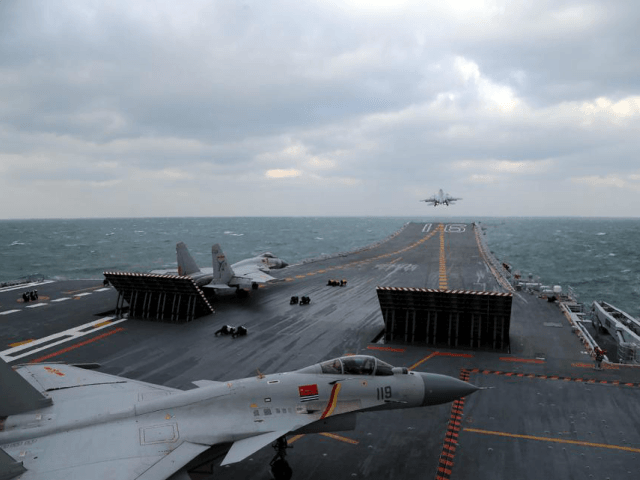Chinese state media reported on Wednesday the national military command responsible for patrols around Taiwan staged a long-endurance, early-warning exercise in March.
A warplane conducted unspecified tactical acrobatics immediately after taking off, a maneuver not commonly seen in previous drills. It was intended to simulate quickly countering enemy planes during wartime, according to the plane’s captain. The Chinese government claimed the plane performed surveillance work and tested airborne strikes. Joining the plane’s exercises was a combat drill by Chinese fighter jets. According to the report, the drill lasted for about 36 hours.
The exercise follows previous Chinese military drills near Taiwan in recent months, at a time in which Taiwan’s government has focused heavily on containing the growing Chinese coronavirus pandemic and received international praise for its successful handling and containment of the disease.
Apparently frustrated by this success, China – which considers the independent country a renegade province – has regularly carried out military maneuvers to place pressure on Taiwan.
In early February, China launched joint drills featuring naval and air forces near Taiwan and a combat-readiness drill in which its warplanes surrounded the independent island. Following days of drills which saw Chinese fighter jets fly close to Taiwanese airspace, crossing over at times, China’s People’s Liberation Army Eastern Theatre Command said its forces had carried out “air-ground assault and fire support drills to further refine and test their multi-service joint combat capabilities.”
In response, the United States has sent military aircraft to operate near Taiwanese airspace to show support for Taiwan. The United States claims to be allied with Taiwan but does not formally recognize that it is a sovereign state. On March 25, the U.S. sent EP-3E Aries electronic warfare and reconnaissance aircraft to fly near Kaohsiung, in southern Taiwan, and Hong Kong.
On Tuesday, a U.S. military aircraft was spotted flying near Taiwan’s southern airspace, the fourth time in March a U.S. warplane had been reported operating near the country. The U.S. military’s frequent operations around Taiwan are designed to support the nation and to deter the Chinese drills.
China has also reportedly been using its military to intimidate other neighboring countries struggling to contain the pandemic that China’s secrecy caused.
On Wednesday, a report confirmed that a China Coast Guard ship had been patrolling recently in the South China Sea near land features claimed by the Philippines, another nation China aims to intimidate through military drills near its waters. Taipei and the Philippines, along with other Southeast Asian nations, lay claim to various islands and sections of water in the South China Sea. China claims almost the entirety of the body of water. A 2016 international legal decision decreed that China’s claims to the region were illegal; China has chosen to ignore the ruling.
On March 24, Taiwanese President Tsai Ing-Wen addressed China’s military aggression in a statement shared via Twitter.
“As the world grapples with the severity of the #COVID19 [Chinese coronavirus] pandemic, China’s military maneuvers around #Taiwan have continued unabated,” Tsai wrote. “Whether it’s national defense or preventing the spread of disease, our armed forces remain as vigilant as ever.”
In its latest show of strength, Taiwan announced it would boost its coronavirus stimulus package to $35 billion on Wednesday, allowing for a donation of 10 million face masks to “allies and countries hardest hit” by the Chinese coronavirus, including the United States.
Taiwan operates independently of Communist China, with its own elected officials, military, and constitution. Despite the fact that Taiwan has never been ruled by Beijing in its history, China maintains a campaign of aggression towards the democratic state and consistently undermines its government.
China blocked the sovereign state from gaining membership in the World Health Organization (WHO), which many believe would have helped alert the world to the severity of the Chinese coronavirus much earlier.
China also places political pressure on Taiwan through rhetorical attacks on its government. On February 7, Chinese state newspaper Global Times published an opinion article in which it cited the Taiwan Affairs Office as saying “the DPP [Democratic Progressive Party] authority that is exploiting the epidemic to seek Taiwan independence is doomed to fail.”
President Tsai is a member of the DPP and Taiwan’s unicameral legislature is majority DPP.
This political attack on Taiwan’s ruling party was reiterated a week later, on February 14, by Chinese state-run news agency Xinhua, which accused the DPP of “banking on the novel coronavirus to seek independence.” It also quoted an official at the Taiwan Affairs Office, who claimed DPP was “doomed to face a shameful defeat.”
On Monday, Taiwan’s government revealed that it had tried to donate 10,000 protective medical suits to China in February, amid an exponential rise in the country’s number of Chinese coronavirus cases, but the Chinese Communist Party refused them.
Despite Beijing’s bullying and hostility toward Taiwan, the democratic state maintains its resolve to fight both the Chinese aggression and the Chinese coronavirus.
“Over the past months, we have seen countless acts of bravery and sacrifice from medical workers around the world. It is our duty as global citizens to give them our full support. We need to step up cooperation, and that means sharing experiences and materials, and working together to develop treatments and vaccines,” President Tsai said on Wednesday.
“Taiwan can help, and Taiwan is helping,” Foreign Minister Joseph Wu added.

COMMENTS
Please let us know if you're having issues with commenting.